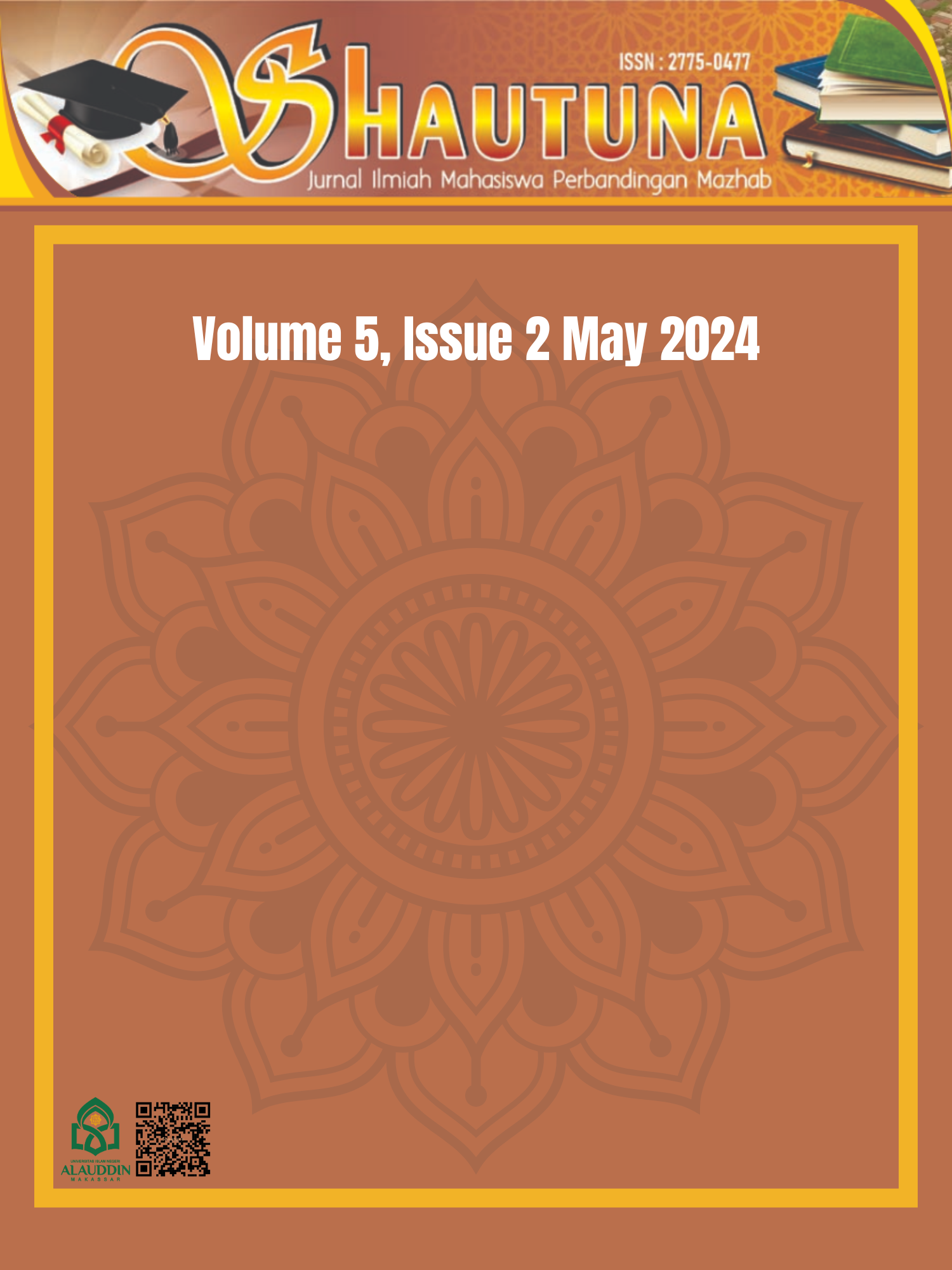Implementation of Regional Regulation No. 3 of 2005 concerning Zakat in the Development of Micro Enterprises in Bantaeng Regency
DOI:
https://doi.org/10.24252/shautuna.v5i2.40254Keywords:
Zakat Management, Regional Regulation No. 3 of 2005, MicroAbstract
This study aims to find out how the management of zakat in Bantaeng Regency is implemented by the local government, as well as how the zakat funds can be used productively in supporting the development of micro businesses for mustahik. Optimal zakat management is not only consumptive, but must also be directed at the aspect of economic empowerment so that mustahik can transform into muzakki in the future. This research uses a qualitative method with a descriptive research type. Data was obtained through field observation techniques, in-depth interviews with related parties, and documentation of the implementation of zakat policies in the region. The results of the study show that the implementation of Bantaeng Regency Regional Regulation Number 3 of 2005 concerning Zakat Management has gone through several main stages, namely: zakat collection, distribution, utilization, reporting, and accountability. The local government through the amil zakat institution has made various efforts to improve the effectiveness of management, including building synergy between Baznas, village governments, and community leaders. One of the prominent forms of zakat utilization is the provision of business capital assistance to mustahik engaged in the micro business sector, such as mobile traders or cart owners around mosques, with a sustainable and community-based approach. The novelty of this research lies in its approach which highlights the function of zakat as an instrument of local economic empowerment based on regional regulations. This shows how zakat is not only a means of charity, but also a strategic tool in alleviating poverty and strengthening the economy of the people at the regional level. These findings make an important contribution to the development of empowerment-based zakat management models in other regions with similar characteristics.
References
Al-Mubarak, Muhammad Adi Riswan, Nurul Iman, and Febri Wimpi Hariadi. “Rekonstruksi Undang-Undang Nomor 23 Tahun 2011 Tentang Pengelolaan Zakat (Analisis Hukum Ekonomi Syariah).” Musyarakah: Journal of Sharia Economic (MJSE) 1, no. 1 (April 25, 2021): 62–79. https://doi.org/10.24269/mjse.v1i1.4166.
Ali, Zainuddin. Metode Penelitian Hukum. Jakarta: Sinar Grafika, 2010.
BAZNAS Kab. Bantaeng. Renstra Zakat BAZNAS Kabupaten Bantaeng. Bantaeng: BAZNAS, 2025.
Dangkeng, Arianto, and Muh Ramli. “Treatment Of Zakat Accounting At The National Zakat Amil Body (Baznas) In Bantaeng Regency.” Jurnal Ar-Ribh 5, no. 1 (2022): 23–32. https://doi.org/10.26618/jei.v5i1.7523.
Elvandari, Siska. Hukum Penyelesaian Sengketa Medis. Yogyakarta: Thafa Media, 2015.
Fatahaya, Shafira, and Rosalia Dika Agustanti. “Legalitas Aborsi Yang Dilakukan Oleh Anak Akibat Perkosaan Inses.” Jurnal USM Law Review 4, no. 2 (2021): 504–24. https://doi.org/10.26623/julr.v4i2.4041.
Fauzan, Pepen Irpan, and Ahmad Khoirul Fata. “Positivisasi Syariah Di Indonesia, Legalisasi Atau Birokratisasi?” Jurnal Konstitusi 15, no. 3 (2018): 592–615. https://doi.org/10.31078/jk1537.
Hidayatullah, Ahmad. “Kontribusi Badan Amil Zakat Nasional (BAZNAS) Daerah Istimewa Yogyakarta Dalam Program Kebencanaan,” 2018. https://dspace.uii.ac.id/handle/123456789/10241.
Mashur, Mashur, Dedi Riswandi, and Ahmad Sibawaihi. “Peran Badan Amil Zakat Nasional (Baznas) Dalam Pemberdayaan Ekonomi Masyarakat (Analisis Pengembangan Ekonomi Islam).” Jurnal Sosial Ekonomi Dan Humaniora 8, no. 4 (2022): 634–39. https://doi.org/10.29303/jseh.v8i4.184.
Maulidya, Aulia Nur Isna. “Pemberdayaan Ekonomi Masyarakat Kecamatan Tapos Melalui Program Depok Sejahtera Baznas Kota Depok Tahun 2018.” Perpustakaan Dakwah dan Ilmu Komunikasi Universitas Islam Negeri Syarif …, n.d. https://repository.uinjkt.ac.id/dspace/handle/123456789/57289.
Muliati, St Cheriah Rasyid. “Persepsi Masyarakat Terhadap Kesadaran Muzakki Dalam Membayar Zakat Di Kabupaten Pinrang.” Diktum 17, no. 1 (2019): 128–50. https://doi.org/0.35905/diktum.v17i1.706.
Ramdhan, Muhammad. Metode Penelitian. Surabaya: Cipta Media Nusantara, 2021.
Sa’diyah, Dewi Fitrotus, and Bhaswarendra Guntur. “Pelaksanaan Undang-Undang Nomor 23 Tahun 2011 Tentang Pengelolaan Zakat (Studi Kasus Di BAZ Kabupaten Nganjuk).” Jurnal Dinamika Ekonomi Syariah 7, no. 1 (2020): 96–118. https://doi.org/10.53429/jdes.v7i1.27.
Santana, Septiawan. Menulis Ilmiah Metodologi Penelitian Kualitatif. Jakarta: Yayasan Pustaka Obor Indonesia, 2010.
Sutantri. “Analisa Pengelolaan Zakat Di Badan Amil Zakat Nasional Kota Kediri.” Jurnal At-Tamwil: Kajian Ekonomi Syariah 2, no. 1 (March 31, 2020): 105–20. https://doi.org/10.33367/at-tamwil.v2i1.1134.
Wahab, Abdul, and Ilma Mahdiya. “Identifikasi Konsep Al-‘Uqud Al-Murakkabah Dan Al-‘Uqud Al-Muta’Addidah Dalam Muamalah Kontemporer.” Islamadina : Jurnal Pemikiran Islam 21, no. 1 (April 25, 2020): 1–16. https://doi.org/10.30595/islamadina.v0i0.5329.
Downloads
Published
How to Cite
Issue
Section
License
Copyright (c) 2024 Yusril Ihza Mahendra, Zulhasari Mustafa

This work is licensed under a Creative Commons Attribution 4.0 International License.









